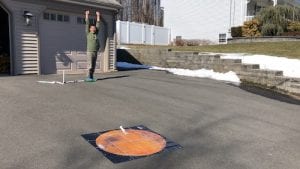Life transformative education begins at a young age for UConn 4-H members. The 4-H project experiences provide a foundation of knowledge and instill enthusiasm for lifelong learning. A group of youth participating in the UConn 4-H Mars Base Camp STEM Club are learning about science, technology, engineering and math while launching rockets and building rovers.
Marc Cournoyer, a 4-H educator with UConn Extension, is leading this seven-week hybrid program via Zoom on Thursday afternoons. Youth participation began in February on the same day the Perseverance rover touched down on the surface of Mars and concludes with their project meeting on April 1st. Curriculum is based on the 2020 National 4-H STEM Challenge and other STEM curriculum. The goal of the program is for youth to explore Mars from rocket launch to setting up a permanent human colony on the red planet. All participants were mailed a program kit prior to the first meeting and each week they have an online discussion in conjunction with hands-on unplugged activities.
 There are 12 youth participating in the program, and they reside in Connecticut, Massachusetts, and Rhode Island. “The virtual nature of this club makes it possible to reach youth from a wider geographic distance” says Cournoyer. During the first week the group focused on rocket launches and getting to Mars – a mat with the image of Mars on it that they could leave a certain distance away from their rocket launch setup. Youth used the rockets to the rescue resources from the 2014 National Youth Science Day kit to build and successfully launch their rockets while tweaking designs to solve for problems encountered along the way.
There are 12 youth participating in the program, and they reside in Connecticut, Massachusetts, and Rhode Island. “The virtual nature of this club makes it possible to reach youth from a wider geographic distance” says Cournoyer. During the first week the group focused on rocket launches and getting to Mars – a mat with the image of Mars on it that they could leave a certain distance away from their rocket launch setup. Youth used the rockets to the rescue resources from the 2014 National Youth Science Day kit to build and successfully launch their rockets while tweaking designs to solve for problems encountered along the way.
“It was wonderful to see participants excitedly carrying their laptops around the house or making parents film their launches so they could proudly share their success,” Cournoyer says. “Throughout the next week I had parents sending me videos that the kids insisted I see as they achieved their goals. The excitement of the participants is obvious.”
The curriculum has focused on engineering design process using techniques of NASA scientists. Experiencing failures in the design and launch process builds resiliency and innovation in the youth and compounds the feeling of achievement when they reach their intended goals. Group meetings include discussions on prototyping and the scientific method, as well as engineering concepts and the science of space. Youth participants have continued researching on their own throughout the week between meetings and share additional related content of their findings.
One parent states, “I just wanted to quickly reach out and say how grateful we are for all you are doing with this club! Jack absolutely loves all the learning and projects, and his curiosity is even stretching beyond your meeting. He’s asking questions, tinkering and overall so happy. Thank you SO much!”
Another parent reached out to say, “Luke Loves Mars camp! He’s a very reserved and shy guy; I am so happy to see him excited about this 🙂 Thank you so much for this program – it’s wonderful!”
“Club members are stretching their minds and imaginations, asking ‘What If?’ As we develop the next generation of scientists and explorers, opportunities to try new things are crucial,” Cournoyer says.
A new virtual 4-H STEM club will start in mid-April and run through May. This next seven-week club will focus on environment awareness and the important role we all play. Parents interested in enrolling youth members can email Marc.Cournoyer@uconn.edu for more information.
UConn 4-H is the youth development program of UConn CAHNR Extension. 4-H is a community of over six million young people across America who are learning Science, Technology, Engineering and Math (STEM), leadership, citizenship and life skills through their 4-H project work. 4-H provides youth with the opportunity to develop lifelong skills including civic engagement and healthy living. Learn more and enroll your child in the UConn 4-H program at http://4-H.uconn.edu/.
UConn CAHNR Extension has more than 100 years’ experience strengthening communities in Connecticut and beyond. Extension programs address the full range of issues set forth in CAHNR’s strategic initiatives:
- Ensuring a vibrant and sustainable agricultural industry and food supply
- Enhancing health and well-being locally, nationally, and globally
- Designing sustainable landscapes across urban-rural interfaces
- Advancing adaptation and resilience in a changing climate.
Programs delivered by Extension reach individuals, communities, and businesses in each of Connecticut’s 169 municipalities.